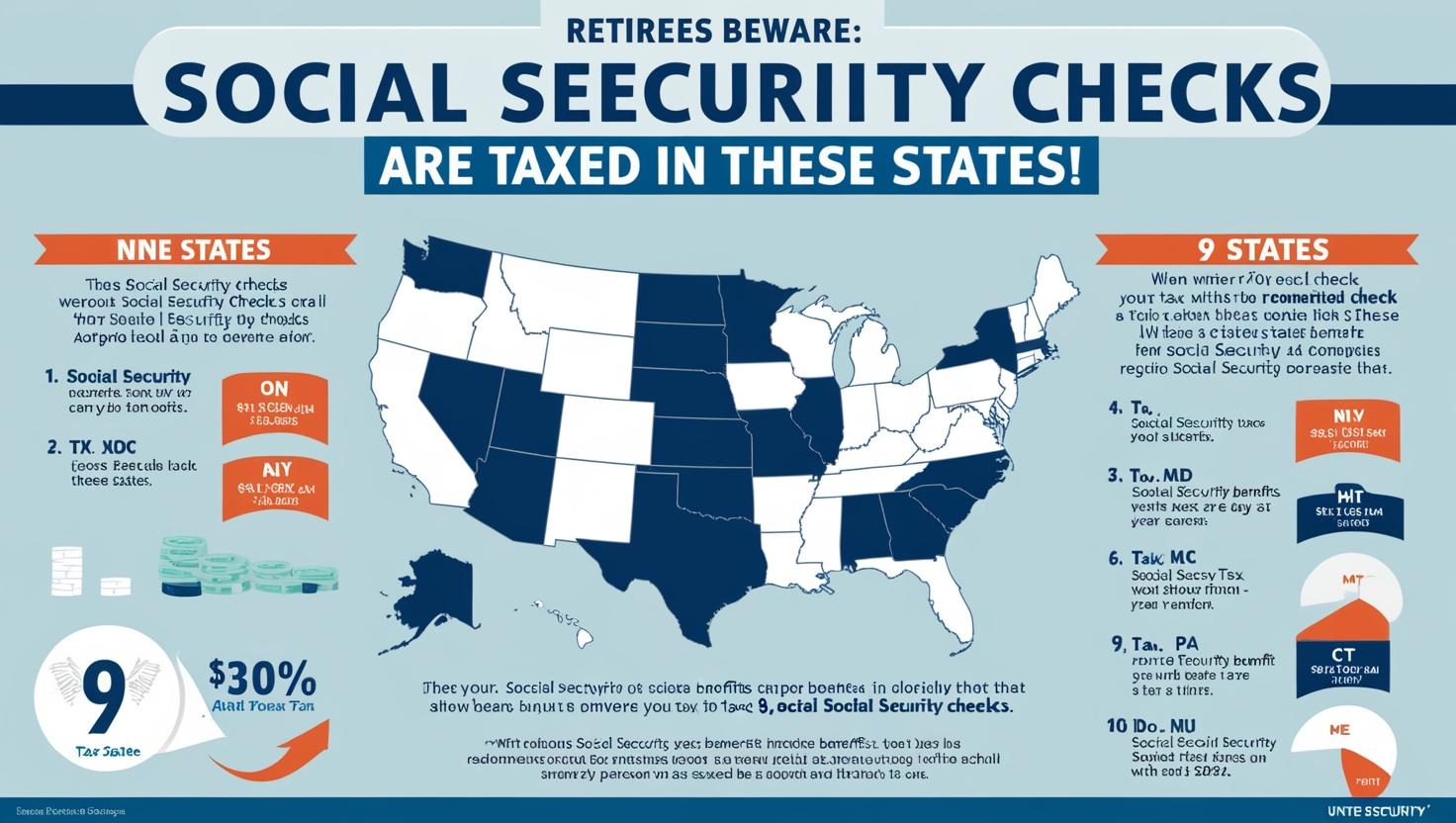Social Security Checks Are Taxed in These 9 States: Did you know that nine U.S. states tax Social Security benefits? Whether you’re already retired or planning for retirement, it’s important to understand how these taxes can affect your income. Find out which states tax your benefits, how much you might owe, and discover strategies to reduce or avoid these taxes. Plus, get expert advice on tax-efficient retirement planning to help protect your hard-earned benefits. Read on to learn more!
Retirement is meant to be a time of relaxation and financial ease, but many retirees are caught off guard when they discover that Social Security benefits are taxed in certain states. If you’re planning for a stress-free retirement, it’s essential to understand how state taxes on these benefits could impact your income.
While most states don’t tax Social Security, nine states still do in some capacity. If you live in—or are considering moving to—one of these states, it’s important to learn how these taxes work and what steps you can take to reduce their financial impact.
Social Security Checks Are Taxed in These 9 States
| Topic | Details |
|---|---|
| States That Tax Social Security | Colorado, Connecticut, Minnesota, Montana, New Mexico, Rhode Island, Utah, Vermont, West Virginia |
| Tax Exemptions & Thresholds | Some states offer exemptions based on income levels or age |
| Strategies to Reduce Taxes | Relocating, adjusting withdrawals, tax credits |
| Other Considerations | Cost of living, healthcare costs, property taxes |
| Link to Official SSA Info | Social Security Administration |
It’s important for retirees to understand how Social Security benefits are taxed. Although only nine states impose these taxes, they can have a significant impact on your retirement income. The good news is that with proper planning and tax-savvy strategies, you can minimize this burden.
Whether you’re considering relocating, optimizing your withdrawals or taking advantage of available exemptions, staying informed enables you to make the most effective financial choices for your retirement.
Understanding Social Security Taxes at the State Level
At the federal level, Social Security benefits might be subject to taxation based on your income. However, when it comes to the state level, nine states still impose taxes on these benefits, each with its own unique rules. Here’s a quick overview of how these states tax Social Security benefits and what retirees need to know:
- Colorado
- Taxes Social Security benefits based on the federal taxable amount.
- Retirees aged 65 and older can deduct all federally taxed benefits.
- Those under 65 may qualify for a partial deduction.
- Connecticut
- Single filers earning below $75,000 are exempt from taxes on Social Security.
- Joint filers are exempt if their income is under $100,000.
- Above these limits, up to 25% of benefits may be taxed.
- Minnesota
- Follows federal tax rates for Social Security.
- Offers a state subtraction for retirees, reducing taxable income.
- Montana
- Follows federal taxation thresholds for determining taxes.
- Offers a $5,500 exemption for seniors aged 65 and older.
- New Mexico
- Provides a full exemption for single filers earning under $100,000 and joint filers earning under $150,000.
- Those above these limits may have up to 85% of their benefits taxed.
- Rhode Island
- Exempts full Social Security benefits for those meeting the federal retirement age.
- Income limits apply for eligibility.
- Utah
- Taxes Social Security but offers a non-refundable tax credit to help offset the tax burden for low- and middle-income retirees.
- Vermont
- Provides a full exemption for incomes below $50,000 (single) and $65,000 (joint).
- Partial exemptions apply for higher earners.
- West Virginia
- Phasing out Social Security taxes by 2026.
- In 2025, a 65% exemption applies.
Social Security Payments Increase for Thousands on February 19 – Will you get it? Check Eligibility
Additional Considerations for Retirees
When planning for retirement, you shouldn’t just think about Social Security taxes – cost-of-living factors play a big role too. Here’s a closer look at what to consider:
- Property taxes: While some states tax Social Security benefits, they may offer relief in the form of lower property taxes. It’s worth comparing these to get an overall picture of your expenses.
- Healthcare costs: Medical expenses can vary significantly depending on where you live. Some states may offer more affordable healthcare options, while others may be more expensive.
- State sales taxes: Even if a state doesn’t tax Social Security, it may make up for it with higher sales taxes. This can affect your day-to-day spending and overall budget.
How to Minimize Social Security Taxes
If you’re living in one of the states that taxes Social Security benefits, don’t worry—there are strategies you can implement to reduce your tax burden:
- Consider moving to a tax-friendly state
- If you’re set on moving, keep in mind that 38 states don’t tax Social Security benefits at all.
- States like Florida, Texas, and Nevada are particularly tax-friendly, with no state income taxes.
- Adjust your retirement withdrawals
- Keep your taxable income below the exemption limits to avoid additional taxes.
- Consider withdrawals from Roth IRAs and HSAs, as these aren’t subject to taxation.
- Take advantage of tax credits and exemptions
- Many states offer senior-specific deductions and exemptions.
- Make sure you’re claiming everything available to you, as these can significantly reduce your taxable income.
- Time your withdrawals wisely
- Delaying your Social Security benefits can help you reduce your tax exposure.
- Also, take advantage of low-income years to convert funds from a traditional IRA to a Roth IRA, which will later be taxed at a lower rate.
By using these strategies, you can make your retirement fund grow further and reduce unnecessary taxes.
